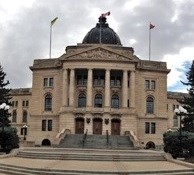The Rural Municipality of Sherwood in southern Saskatchewan has yet again become an example of what not to do in dealing with municipal conflicts of interest.
Three reports were issued Friday by Saskatchewan’s ombudsman, Mary McFadyen, into alleged conflicts of two municipal council members in the RM, as well as a separate case involving the ex-mayor of the village of Manor.
In the case of Sherwood, McFadyen found councillor Tim Probe, who was also deputy reeve, and former Councillor Joe Repetski were both in a conflict of interest at a Jan. 13, 2016 council meeting in the R.M.
She has also recommended the RM vote on whether to apply to the Court of Queen’s Bench for an order to disqualify Probe from sitting on council. Repetski did not seek re-election.
The two councillors had not declared a conflict of interest during that meeting, when a delegation of voters made a presentation requesting the RM take steps to recover money paid to the two councillors under a bylaw quashed by the Queen’s Bench court.
The money covered their legal fees related to the Barclay Inquiry that examined whether any Sherwood council members had a pecuniary interest in the proposed Wascana Village development.
The investigation that followed led to Sherwood reeve Kevin Eberle being removed from office by the province in February 2015 over his conflicts of interest involving that development.
According to a summary of the investigation at the ombudsman’s website, the RM had reimbursed both councillors Probe and Repetski’s fees under its Indemnity Bylaw. That bylaw was later determined by the court to be invalid in a Septmber 2015 decision.
At their Jan. 13, 2016 meeting, a motion was made to take steps to recover the money paid out to Probe and Repetski by the RM.
But according to the ombudsman’s office, instead of declaring a conflict of interest and leaving the room, as was required under the Municipalities Act, Probe and Repetski instead focused council’s attention as to whether the motion was properly before council under Robert’s Rules of Order.
Council then postponed the motion. But McFadyen pointed out that had Probe and Repetski followed the conflict of interest rules, the motion would not have been put off.
Council eventually came to a decision to take steps to recover the money paid, but that did not take place until an Oct. 28, 2016 special meeting.
By then, both councillors were already in trouble, with Probe facing criminal charges for municipal corruption and breach of trust, as well as provincial calls for his removal from office. Neither councillor took part in the Oct. 28 special meeting.
The ombudsman also weighed in on a separate conflict situation, this one involving the village of Manor. There, the village made a decision to sell what was previously a public campground site to the former mayor’s son, but it was found the former mayor did not properly declare and disclose that conflict of interest.
The village also did not follow its own public notice bylaw, failing to give notice of its intention to sell the land.
In a statement, McFadyen said these instances show that conflicts do arise.
“Residents need to know that their council members are acting only in the best interest of their community. It is not uncommon for council members to have private interests that could conflict with their ability to carry out their public duties. That’s why it is so important for them to know what to do to address conflicts of interest.”
In its news release, the ombudsman’s office cited a wide range of rules under the Cities Act, the Municipalities Act, and the Northern Municipalities Act 2010 to deal with a conflict of interest.
In those instances council members are required to declare a conflict before the matter comes up they must disclose what it is and how it might affect his or her impartiality they are required to abstain from a vote on any question, decision, recommendation or other action on the matter and refrain from participating in any discussion. They must leave the room until discussion and a vote is concluded.
Consequences for those who do not follow the rules include resignation and ineligibility from nomination or election in any municipality for 12 years.
As for the RM of Sherwood, the ongoing issues there ultimately led to changes to provincial legislation to bring in more stringent disclosure requirements and regulations for municipalities.
New provincial legislation kicked in on the day of the municipal election, Oct. 26, 2016. The requirements had an immediate effect on municipal governments across Saskatchewan including the Battlefords area.
After the municipal election, North Battleford council introduced an updated code of ethics and new disclosure forms. Those included more extensive and stringent requirements for elected officials to declare information about employers, land holdings within the municipality, and other conflicts.
The disclosure forms were discussed at council at their Nov. 14 meeting. At that time Mayor Ryan Bater explained the main change was that disclosure was now required not just from elected officials, but for immediate family as well.
The Town of Battleford also updated and strengthened their disclosure requirements early in 2016.
There as well, the conflict of interest issues in the RM of Sherwood and tougher provincial rules were cited as reasons behind the changes.




